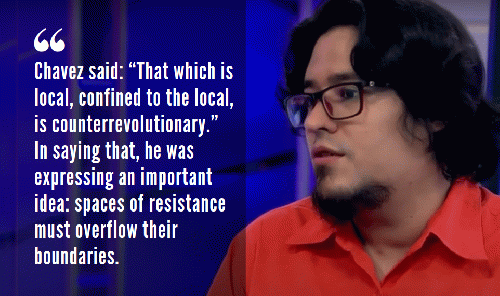A young Venezuelan writer argues that movements must overcome the fetish of localized resistance to contest power.
manuel_azueje_va.png
An author and professor, Manuel Azuaje's articles have been widely published. He is a member of Intellectuals in Defense of Humanity, an international network of left and progressive intellectuals. Among the themes Azuaje has addressed in his writings and lectures are Chavez's political and intellectual evolution, the question of democracy in the Bolivarian Process, and Venezuela's popular power initiatives. He is also the editor of a book on Lenin's writings during the course of 1917.
In this interview, Azuaje argues that we should avoid both a generalized pessimism, on the one hand, and an idealization of grassroots organizations, on the other. He also calls for intellectuals to examine the Bolivarian Process in relation to its prehistory: the correlation of forces leading to Chavez's 1998 election.
It is said that Chavez and the Bolivarian movement broke with Venezuela's "one hundred years of solitude." Now, however, the progressive cycle in Latin America seems to be ending, and we could be entering another century of isolation. As a young intellectual who grew up with Hugo Cha'vez as president, what do you think of this situation?
We are living in times of uncertainty: times when things that we never thought would happen are happening now at an accelerated rate. Due to the pandemic and the quarantine, we are all locked up, the police are in the streets, there are limitations of movement due to security and health concerns, there is a deadly disease that threatens the world... and, with all that, we remain at a standstill. These are things that we couldn't imagine months ago.
So, I would say that there is a general feeling of uncertainty, on the one hand, and a withdrawal of sorts, on the other. That is because the Chavista left has been defeated in some areas. We have retreated, and that can lead to a feeling of being defeated" Even if one retreats in order to later advance forward, one senses a feeling of unease that goes along with the collective uncertainty in the crisis.
However, there is a real willingness to struggle in some parts of Venezuelan and Latin American society. Some groups continue to organize and advance.
It is important to not fall into a generalized pessimism. We shouldn't ignore the existence of the sectors of the population that have a willingness to go on struggling and building alternatives. However, we shouldn't make a fetish out of happiness either. Being triumphant about resilience alone - the idea that pure resistance is a positive form of life - must be dismissed. We must have political victories or, at least, prepare for them. We have to advance towards life: towards achieving collective wellbeing. We have to struggle to win and cannot be permanently in a state of resistance.
The fetish of pessimism and the fetish of resilience - of the heroic pueblo - are two poles that we should avoid. These attitudes intermingle: there is despair and there is naivete, and neither offers a solution.
(Note: You can view every article as one long page if you sign up as an Advocate Member, or higher).






